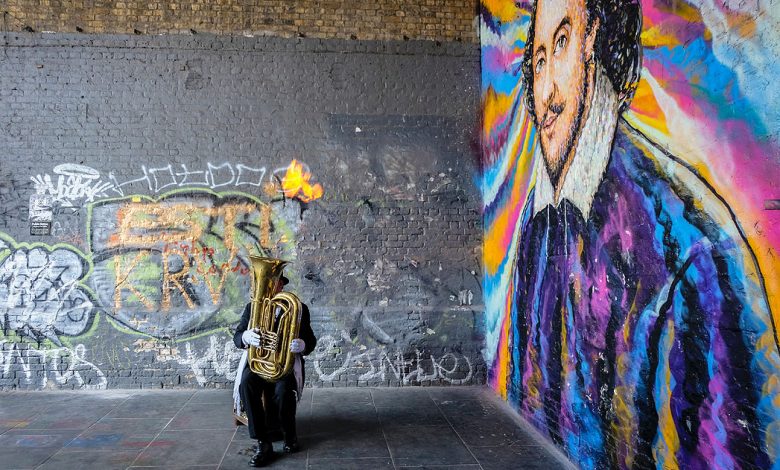When we were kings: What Shakespeare says about being No. 1

ONE foreboding royal ancestor stares down at visitors who enter Westminster Abbey through the great doors at the west end of the nave. Just steps before you reach the memorial to the unknown soldier is the first known painting of an English monarch, based on living observation if not an actual sitting. That is Richard II on the coronation chair, his more than 600-year-old visage placid but on the verge of a sneer. He is both legacy and warning, not just for Charles III, who will have passed beneath him on the way to his own anointing, but for you and I.
Charles’ crowning is religious pantomime, dramatizing the special relationship between the divine and the head of the royal family — and, by extension, with Britain itself. It’s all about being the chosen one.
Handel’s majestic coronation anthem (reminiscent of the Hallelujah chorus of his Messiah) invokes Zadok, the high priest of Israel, whose blessing ushers Solomon into kingship over God’s people. It will be performed while Charles is daubed with olive oil from holy hills in Palestine. This anointing takes place behind a screen to parallel the intimacy of Moses meeting face-to-face with the presence of God.
I’ve already heard one church sermon comparing Charles, the climate warrior, with Solomon, who had a deep knowledge of trees and birds and beasts. How glorious it is to be a master of the universe.
We know too much of Charles’ romantic history to truly see him as Solomon, “the wisest of men.” But as any wizened journalist has learned, there are wonders you can do to a story just by having a titled personage at the center of your narrative. Put a tiara on it and you’ve got nothing but readers. We all gravitate toward crowns because we aspire to them; we’d like to be kings and queens ourselves, even if it’s only in our own little universes.
That’s where Richard II becomes a parable for us all. He was a true master of 14th century Europe. He was Christ-like from his first moments on earth: His birth on the Feast of the Epiphany was attended by three kings — of Castille, Portugal, and Navarre. His father was Edward the Black Prince, heir to the throne who died of dysentery before he could succeed, so it was 10-year-old Richard who became king at the death of his grandfather Edward III. Richard’s first wife, Anne of Bohemia, was the daughter of the Holy Roman Emperor. He was physically imposing, too: Six feet tall in an epoch of short men.
But Richard was a disastrous king: tyrannical, perhaps schizophrenic, given to rages and conspiracies. When Anne died, he was so distraught he razed the palace where she’d breathed her last. He was deposed in a coup by a first cousin he had exiled — Henry Bolingbroke who became Henry IV.
Shakespeare too drew a portrait of Richard II. It’s certainly not from life — about two centuries separated them — but it derives from the playwright’s unerring grasp of the human condition. Richard gets one of his most moving speeches. The monarch has been an unsympathetic fop for most of the play that bears his name. Then, in the throes of trying to regain power, he realizes his allies have deserted him, that he is no longer in charge, that he cannot even pretend to be the ruler of England. He is devastated.
For God’s sake, let us sit upon the ground
And tell sad stories of the death of kings —
How some have been deposed, some slain in war,
Some haunted by the ghosts they have deposed,
Some poisoned by their wives, some sleeping killed,
All murdered. For within the hollow crown
That rounds the mortal temples of a king
Keeps Death his court, and there the antic sits,
Scoffing his state and grinning at his pomp,
Allowing him a breath, a little scene,
To monarchize, be feared, and kill with looks,
Infusing him with self and vain conceit,
As if this flesh which walls about our life
Were brass impregnable; and humored thus,
Comes at the last and with a little pin
Bores through his castle wall, and farewell, king!
Fate and failure reveal the fragility of power. After reaching the peak, there is no other choice but to descend — and sometimes, like Richard, you fall. This is his moment of existential clarity:
For you have but mistook me all this while.
I live with bread like you, feel want,
Taste grief, need friends. Subjected thus,
How can you say to me I am a king?
In the play, he is imprisoned and then murdered. In real life, Richard probably died of starvation in his cell. History is unforgiving and often more enlightening than scripture. Certainly more chilling.
Britain has seen so many principalities and powers crest and fall, it would be unwise to ignore the sad stories. But this is a grim lesson on a celebratory weekend. There must be some more practical takeaway for our daily lives than despair. Do all our strivings to be among the best and the brightest end with hollow crowns?
I take solace again in Westminster Abbey. It’s the site of an annual theatrical event: a walking tour of the church where most every corner and nook becomes a stage for the dramatization of scenes by the Bard of Avon. On a rainy March Friday, at the latest edition of Shakespeare in the Abbey, I stood by the memorials to Isaac Newton and Stephen Hawking — masters of the universe in a different way — and listened to an actor perform Prospero’s final speech from the Tempest. The formidable wonder-worker has come to a decision.
…graves at my command
Have waked their sleepers, oped, and let ’em forth
By my so potent art. But this rough magic
I here abjure, and, when I have required
Some heavenly music, which even now I do,
To work mine end upon their senses that
This airy charm is for, I’ll break my staff,
Bury it certain fathoms in the earth,
And deeper than did ever plummet sound
I’ll drown my book.
The wizard is giving up the very instruments that have made him overlord of the enchanted island. He realizes it is time to shift away from being in charge. He has the wisdom to cede it, knowing that a willing abdication is better than the shock of having authority taken from you. Power, as with all earthly things, is impermanent. As Prospero says earlier in the play,
The cloud-capp’d towers, the gorgeous palaces,
The solemn temples, the great globe itself,
Ye all which it inherit, shall dissolve
And, like this insubstantial pageant faded,
Leave not a rack behind. We are such stuff
As dreams are made on, and our little life
Is rounded with a sleep.
Know when to step away from the pantomime.
BLOOMBERG OPINION




